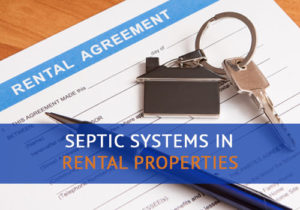When looking for a new tenant, we meticulously scrutinize credit scores, income levels, and past landlord references. On the other hand, potential renters dive into home details like bedrooms, average utility costs, storage and parking. But, no one ever talks about where the houses’ waste goes or potential tenants’ bathroom habits. So, what should landlords and tenants know about septic systems in rental properties?
Septic Systems in Rental Properties
 With 1 in 4 residents in the United States relying on wells or septic systems, the chances of coming across a rental property with a septic system are relatively high. If your property, whether the owner or the renter, is one of this 25 % of homes, you have a few added responsibilities compared to a home on the city’s waste management program.
With 1 in 4 residents in the United States relying on wells or septic systems, the chances of coming across a rental property with a septic system are relatively high. If your property, whether the owner or the renter, is one of this 25 % of homes, you have a few added responsibilities compared to a home on the city’s waste management program.
Septic Tips for Landlords & Owners
Liveable accommodations fall under the responsibility of a Landlord. Many states require the maintenance of the septic tank as part of that general responsibility. But, that doesn’t mean you’re stuck with the cost of repairs—or even pumping.
It’s important to set the guidelines from the start—and get agreements down in writing. Here are a few things to consider when renting a property with a septic system.
Who pays for the Septic Tank Pumping?
Usually done every three to five years, this most often falls to the Landlord. However, you can build it into the price of the rent. But, many landlords just accept this as a “rental property” cost associated with the industry.
What happens when septic problems arise?
Similar to any problem with a rental property, tenants contact their Landlord who then investigates the issue. From there, payments and repair costs can be divided based on who is at fault. If it’s due to improper use, the Landlord can require payment from the tenant.
However, this only works if the Landlord has done their Due Diligence of notifying the tenant their property uses a septic system as well as giving basic rules for living with a septic system. Remeber 75% of homes do not operate with septic systems. Tenants may be unaware of the unique requirements of living with septic systems—its your responsibility to make them aware.
Who is in charge of landscaping?
Septic Systems aren’t just sensitive to what tenants do inside the home; landscaping can damage the system as well. This leads to some important questions…
- Who is responsible for landscaping?
- If the tenants are responsible for lawn care, are they aware of the layout of the septic system?
- Do they know what plants are safe?
- What happens if it storms and floods?
As the Landlord or Rental Property Owner, it’s your responsibility to notify your tenants.
While managing a rental property with a septic system has some added responsibilities, it may not fall solely on the Landlord. However, it’s essential to state expectations and responsibilities to all the tenants to prevent excessive damage caused by being unaware.
Septic Tips for Tenants
Tenants, do your homework! If you’ve never lived in a home with a septic tank, find out what habits hurt the system, like excessive use of the garbage disposal and use of chlorine bleach products. Ask yourself, what practices need to change? Are there any hidden costs?
And make sure to discuss all this with the Landlord. Under what circumstances would you cover costs of damage? If excessive rain floods the system and you were in charge of storm drains, are your responsible for repairs? While your day-to-day habits can quickly change, make sure you are comfortable and fully-aware of your septic responsibilities before signing.
Communication will always be priority one when dealing with septic systems in rental properties. Discussions of each parities septic knowledge, the specific needs of the property’s system and financial coverage should happen before signing the lease—included in writing. Have questions? Contact Advanced Septic Services of Florida for more information.

